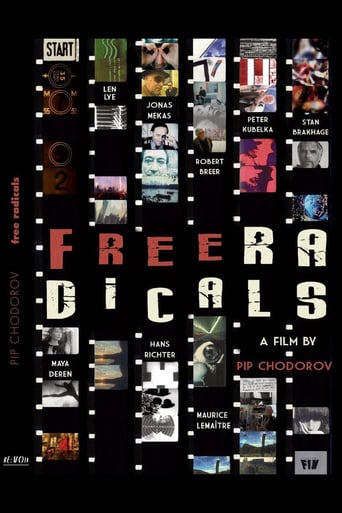

I'm not sure why director Chodorov spends the first part of this movie talking mainly about himself. First he lets you know he's an experimental filmmaker, and when he mentions other, more famous, filmmakers, he talks about them in the context of what they meant to his own works. Perhaps he felt it was necessary to explain why he wanted to make the movie, or to give some context as to why these filmmakers were significant, but it's like telling someone about the time you met Hemingway and then spending the first 15 minutes talking about the book you're working on.Just as I was about to give up hope there would be any sort of documentary at all, Chodorov got down to the business of talking about other people. While he briefly discusses works throughout the history of film, he is mainly focused on a few New York experimental filmmakers. The movie is a mix of interviews and clips along with some general context. I'm not big on underground cinema (although I did like the namesake clip, Free Radicals and the works the guy who did the Gilliam- style - before Gilliam - cutout animation), but if you are, clips tend to be generously long, letting audiences fully appreciate the works. The interviews are generally interesting.There isn't much shape to this movie, as the director feels letting you hear the filmmakers and see their works is all you need. The closest thing to a them is that experimental film making is the least lucrative art of the avant-garde. If you're really interesting in the subject, or you don't realize that you would be fascinated by experimental film if you just saw some, you'll probably really enjoy this. But while some documentary makers can bring any subject to life for any audience, that's not the case here. How much you like this will depend a lot on how much you want to like it.
... View More"Free Radicals" consists of Chodorov briefly talking about himself and his own background with art films, interviews with many art film makers (some living some done before the artists died), clips, discussion of an art film museum and the difficulty marketing and making money from the films.Pip Chodorov made this film about art/avant garde films. Because it's more of a homage, it's not a true history and isn't exhaustive. Fortunately, Chodorov acknowledges this and admits that the film does not talk about all the important art films or art film makers. So who is the audience? After all, most folks hate art films and have very little appreciation for them. I like art films much more than the average person and I must admit that some of them I can't stand either! So, this is a hard-sell film--and I can see why Turner Classic Movies showed it very late at night! But, for the right person, this film is clearly a must-see.
... View MoreThis film is a personal product, almost an experimental film in itself. It starts off with a bit of self-promotion which is best forgotten because what comes later is better. It does not pretend to be "The" history of Experimental film (only "a history"), fortunately, and on that basis it is somewhat of a success. It focuses on the NY circle around the Film-Makers Cooperative, founded by the Mekas brothers. The director Pip Chodorov had personal access to lots of the creators featured here, such as Hans Richter, Stan Brakahge, Ken Jacobs, and several others. We see lots of footage, intermixed with interviews with selected folks. So yes it's good, and worth a look. However, lots and lots of creators are left out of this or given very short treatment: Kenneth Anger, Oscar Fischinger, Fernand Leger, Bruce Conner, Mary Ellen Bute, Larry Jordan, and more. So it could have been more expansive. As long as you know that going in, you are fine. See this and enjoy it.
... View MoreFree Radicals: A History of Experimental Film (2012)*** (out of 4)Good documentary covering a brief history of the experimental films that gained popularity over the past four decades, although the avant-garde cinema has been around for as long as film has. If you're familiar with names like Stan Brakhage, Robert Breer, Maurice Lemaitre and Ken Jacobs then you're really going to enjoy this documentary because you get to hear from them as well as various other filmmakers who create these types of films. If you're unaware of these names then you're still going to have a good time watching this because you're going to get to see some great film clips and learn a little bit of history. The "A" in the title is a strong one to pay attention to because the film doesn't set out to the "the" history of experimental films but instead just a certain aspect of it. I think someone like Georges Meliels could have been included here and there are some other famous early avant-garde films that are not mentioned. Instead, the documentary really focuses on films that happened after WWII and this is where the before mentioned names come into play. There's also talk about some of the hard times that these filmmakers would face as there's certainly not much funding for these types of movies and there are even smaller crowds willing to watch them.
... View More